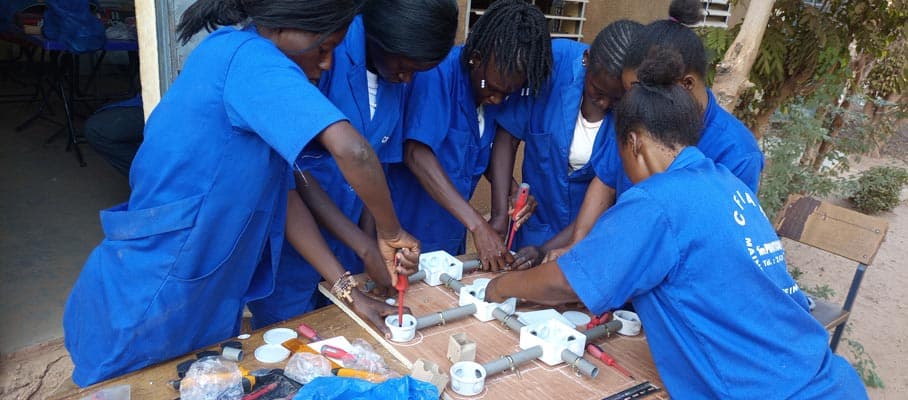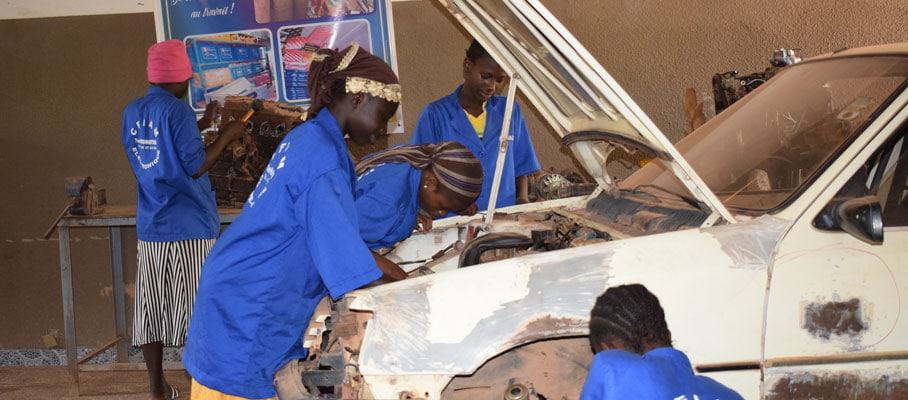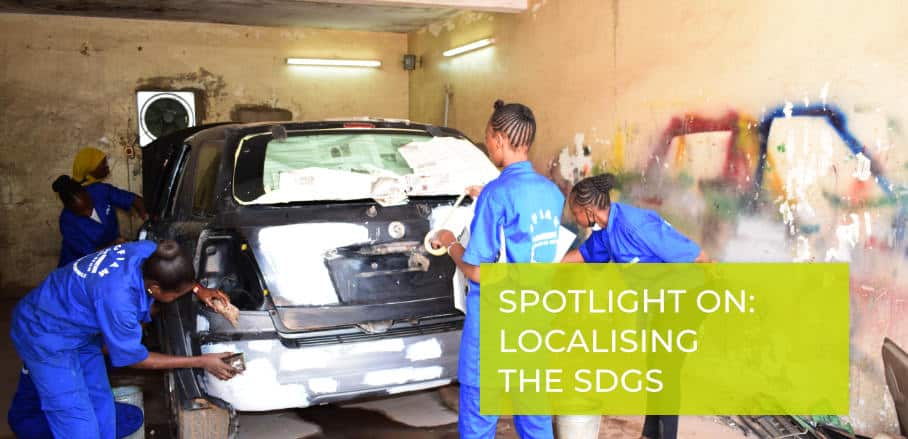Meeting the Challenge of Gender Equality in Burkina Faso
In Burkina Faso, women are taking up the challenge of diversifying their professional choices. With the support of CFIAM, they are proving that non-traditional occupations are not the exclusive domain of men. Bernard Zongo shares the main lessons learned.
Burkina Faso has a population of 20,487,979 inhabitants, of whom 51.7 per cent are women. The population is also very young. About 45 percent are under 15 and 78 percent are under 35 years of age. The annual population growth rate of 2.93 percent between 2006 and 2019 is among the top 20 in the world and the capital city of Ouagadougou has 2.5 million inhabitants.
It is in this context that the Association Tout pour Tous – Yennenga (ATTous-Yennenga), a purely social organisation, was born from the reflection of a group of Burkinabe educators in 1994. Its mission is to promote the socio-professional integration of young people in difficulty, the social reintegration of prisoners and the elderly, as well as human rights and environmental protection. The vision of ATTous is to work for a world where women and men, especially girls, are fulfilled and contribute significantly to the socio-economic development of their communities by 2027.
The Centre Féminin d’Initiation et d’Apprentissage aux Métiers de Ouagadougou (CFIAM- Ouaga), which will be discussed in this article, is the centre through which the association has taken up the challenge of working for professional equity for men and women in Burkina Faso in non-traditional trades.

Participants training their skills © ATTous-Yennenga
Professional Equity for All
In Burkina Faso, numerous inequalities and disparities between men and women still exist in terms of access to paid and unpaid employment and the exercise of a profession. These disparities are based on the traditional sexual division of labour, which is unfavourable to women. Indeed, despite their numerical superiority, many women confine themselves to so-called “traditionally female” sectors such as teaching and paramedical services.
For our purposes, we defined a non-traditional occupation for women as one in which they are less than 33 per cent represented. About 180 young women are currently in training at CFIAM, in automotive electricity, electronics, bodywork and industrial maintenance, as well as sewing, which is a mixed trade. To break the myth of non-traditional trades and to promote access to technical and vocational training for all, ATTous conducts awareness-raising activities (skits, films, music videos, leaflets, and radio programmes) and has set up Non-Traditional Trades Committees (NTCs) in nine neighbourhoods of the Ouagadougou commune. These NTCs allow the programme to reach its main target group, namely women in difficult situations between the ages of 15 and 25.
In order to enable the learners to be competitive on the job market and to overcome the difficulties linked to the stereotypes attached to the professions, ATTous accompanies the quality technical training it provides with permanent psychological support, sensitisation to Sexually Transmitted Infections (STIs) and unwanted pregnancies, training in computer science and in human rights. Through a rigorous application of its own child protection policy, ATTous has made the CFIAM a safe place for learners. Finally, the establishment of a crèche within the centre allows mothers to adapt well to their training because their children are safe.
Monitoring and Follow-Up are Essential
In addition, ATTous has also developed a socio-professional integration policy through a post-training follow-up system, designed to guarantee decent employment to all its beneficiaries. This system consists of five key elements:
- The follow-up of the last 5 promotions
- The establishment of a database for the women at the end of their training as well as a database of potential employers. This database serves as an interface between employers and trainees looking for a job.
- To provide support and advice to the newly created businesses.
- Provide additional training in entrepreneurship and management and individualised coaching to enable each trainee to develop their business plan.
- To set up a credit fund to finance the business plans of the graduates.
This follow-up system facilitates the access of young women to employment, both self-employment and hiring, and allows ATTous to stay in touch with the trainees in work situations and to identify the difficulties they encounter. This allows ATTous to refocus the training in the centre to meet the requirements of the job market.

Participants learn how to fix a car © ATTous-Yennenga
The Results Speak for Themselves
In terms of professional integration, out of our 184 graduates, 88 have been hired, 62 have created their own micro-enterprise, 21 are in continuing education, 8 are pursuing their studies and 5 are unemployed. As far as academic results are concerned, we have the following success rates for graduation: sewing 92.5 per cent, bodywork 100 per cent, automotive electricity 83.3 per cent and electronics 81.25 per cent.
We can also note a progressive change of mentality. Before, some parents did not want their children working in non-traditional trades. Some garage customers did not accept that women repair their vehicles. At other times, employers were reluctant to employ young women – even some of these young women were rather hesitant or refused to train in non-traditional trades. But now more and more people accept, embrace, and promote the new status quo. Our work thus sparks a significant change in the mindset of many people. Besides it contributes to the provision of qualified female labour to the companies we collaborate with and to alleviating the unemployment rate in Burkina Faso.
In the future, ATTous will work to strengthen the current achievements and to perpetuate its vocational training offers through a reduction of the financial dependence of the centre on technical and financial partners. Finally, the association wishes to export its experience in vocational training in the sub-region.
- Meeting the Challenge of Gender Equality in Burkina Faso - 22. July 2021
